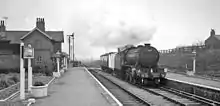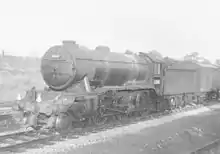| GNR Class H4 LNER Class K3 | |||||||||||||||||||||
|---|---|---|---|---|---|---|---|---|---|---|---|---|---|---|---|---|---|---|---|---|---|
.jpg.webp) K3 2-6-0 No. 1387 at York 1939 | |||||||||||||||||||||
| |||||||||||||||||||||
| |||||||||||||||||||||
| |||||||||||||||||||||
| |||||||||||||||||||||

The Great Northern Railway Class H4 (classified K3 by the LNER) was a class of 2-6-0 steam locomotive designed for mixed-traffic work.
The type was a more powerful development of the earlier H3 (LNER K2) class and was notable at the time, as the 6-foot-diameter (1.8 m) boilers were the largest fitted to any British locomotive to that date. After formation of the London and North Eastern Railway, the type became known as class K3 and was adopted as an LNER standard design. They got the nickname "Jazzers" after the rhythm of their exhaust beat and the unbalanced gyratory movement.[1]
Construction

The first ten locomotives were built at the GNR's Doncaster Works in 1920, to the design of Nigel Gresley. Six further batches were built at Doncaster and Darlington Works, Armstrong Whitworth, Robert Stephenson and Company and the North British Locomotive Company. The last few of 193 examples were delivered in 1937.
Use
They were excellent mixed-traffic locomotives, although their large size restricted their route availability. In their latter years they were primarily employed on vacuum-fitted freight traffic.
Accidents and incidents
- On 15 June 1936, locomotive No. 4009 was hauling an express passenger train which was in a rear-end collision at Welwyn Garden City, Hertfordshire due to a signalman's error. Fourteen people were killed and 29 were injured.
- In July 1936, locomotive No. 2764 was involved in a serious accident at Postland, Lincolnshire.[2]
- On 8 March 1937, locomotive No. 126 was hauling a passenger train that was derailed at Langrick, Lincolnshire due to the condition of the track.[2]
- On 25 August 1956, locomotive No. 61846 was hauling an empty stock train which ran away and crashed through the buffers at Filey Holiday Camp station, Yorkshire. The accident was due to the failure to connect the brake pipe between the train and locomotive.[3]
Class K5
In 1945, Edward Thompson rebuilt K3 No. 206 into a two-cylinder engine forming the LNER Class K5. No more were so treated, although some later received K5 type boilers.
Numbering
The original ten locomotives were numbered 1000–1009 by the GNR, and became LNER 4000–4009. Those built for the LNER were numbered haphazardly, filling in gaps in the LNER's numbering scheme. In the LNER's 1946 renumbering programme, the K3s and K5 were renumbered 1800–1992, and they later became British Railways 61800–61992.
Withdrawal
All were withdrawn and scrapped between 1959 and 1962; the K5 went in 1960. None have survived into preservation. Three were kept as stationary boilers until 1965.[4]
Possible Future Revival
None of the original K3's were preserved; however, it was announced in September 2018 that following on from the LNER Class V4 no 3403 & LNER Class V3 projects where new engines are planned to be built. A new K3 is to be built after these are completed. The number of the engine has not yet been confirmed, but is expected to be a replica of an original engine since the number 61993 was allocated to the LNER Class K4's.[5]
References
- ↑ "The Gresley K3 and Thompson K5 2-6-0 Moguls". LNER.info. Retrieved 2 February 2019.
- 1 2 Earnshaw, Alan (1991). Trains in Trouble: Vol. 7. Penryn: Atlantic Books. p. 26. ISBN 0-906899-50-8.
- ↑ Trevena, Arthur (1981). Trains in Trouble: Vol. 2. Redruth: Atlantic Books. p. 39. ISBN 0-906899 03 6.
- ↑ Marsden, Richard. "The Gresley K3 and Thompson K5 2-6-0 Moguls". LNER Encyclopedia. Winwaed Software Technology LLC. Retrieved 15 October 2020.
- ↑ https://www.a1steam.com/2018/09/06/v4-design-reaches-pre-launch-stage/ K3 Project to be looked at
- Sources
- Longworth, Hugh (2005). British Railway Steam Locomotives 1948-1968. Hersham: Ian Allan. ISBN 978-0-86093-593-3.
- Ian Allan ABC of British Railways Locomotives (1948 ed.). part 4, page 17.